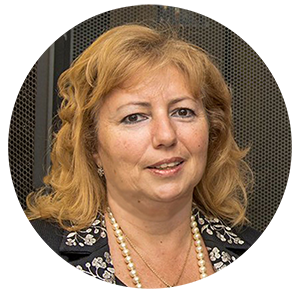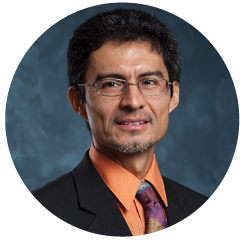 Researchers from IDSC are exploring the interface between the human brain and technology through a collaborative international initiative. “We are working closely with scientists from Europe and Israel in fields like medical informatics, brain-computer interfaces, and biomarkers for diseases like COVID-19,” said Yelena Yesha, PhD, Knight Foundation Chair of Data Science and AI, and IDSC Innovation Officer. “These novel interfaces allow people to interact with the environment by directly processing brain signals, thus bypassing the natural pathways of nerves and muscles.”
Researchers from IDSC are exploring the interface between the human brain and technology through a collaborative international initiative. “We are working closely with scientists from Europe and Israel in fields like medical informatics, brain-computer interfaces, and biomarkers for diseases like COVID-19,” said Yelena Yesha, PhD, Knight Foundation Chair of Data Science and AI, and IDSC Innovation Officer. “These novel interfaces allow people to interact with the environment by directly processing brain signals, thus bypassing the natural pathways of nerves and muscles.”

In her role at IDSC and as the Founding Director of NSF CARTA (the Center for Accelerated Real Time Analytics), Dr. Yesha is collaborating on brain modeling applications with Mira Marcus-Kalish, PhD, Director of International Research Collaborations at Tel Aviv University in Israel. Dr. Yesha helped organize the 2020 BRAIN Initiative® Investigators Meeting, a virtual global conference held in June. “The Conference provided a forum for discussing exciting scientific developments and potential new directions, and identifying areas for collaboration and research coordination,” said Dr. Yesha. She added that CARTA’s contribution to the initiative could include collaboration with medical centers for recipients of prosthetics, access to medical data of the South American and African-American populations, and research from The Miami Project to Cure Paralysis.
 Other UM participants from the BRAIN meeting were IDSC Education Director Dr. Mitsunori Ogihara, who moderated a session on the “Medical Informatics Platform (MIP),” including Data Sharing, Cybersecurity, and Cloud Computing. Odelia Schwartz, PhD, Associate Professor of Computer Science and Director of the UM Brain and Machine Learning Laboratory, moderated a session on “Biomarkers.” Faculty members from several leading universities discussed “Computational Modeling and Human Brain Simulation,” and “Closed-loop AI-NeuroRobotics” as well as medical informatics and biomarkers.
Other UM participants from the BRAIN meeting were IDSC Education Director Dr. Mitsunori Ogihara, who moderated a session on the “Medical Informatics Platform (MIP),” including Data Sharing, Cybersecurity, and Cloud Computing. Odelia Schwartz, PhD, Associate Professor of Computer Science and Director of the UM Brain and Machine Learning Laboratory, moderated a session on “Biomarkers.” Faculty members from several leading universities discussed “Computational Modeling and Human Brain Simulation,” and “Closed-loop AI-NeuroRobotics” as well as medical informatics and biomarkers.
 The 2020 BRAIN Conference was hosted by the Building Reliable Advances and Innovation in Neurotechnology (BRAIN) Center, an I/UCRC at Arizona State University, and the University of Houston. “Our goal is to support rigorous testing of the efficacy, safety, and long-term reliability of neurotechnology that would not be otherwise possible within the traditional ‘silos’ of academic, industry, regulatory, and clinical communities,” said José Luis Contreras-Vidal, PhD, Professor of Electrical and Computer Engineering at the University of Houston.
The 2020 BRAIN Conference was hosted by the Building Reliable Advances and Innovation in Neurotechnology (BRAIN) Center, an I/UCRC at Arizona State University, and the University of Houston. “Our goal is to support rigorous testing of the efficacy, safety, and long-term reliability of neurotechnology that would not be otherwise possible within the traditional ‘silos’ of academic, industry, regulatory, and clinical communities,” said José Luis Contreras-Vidal, PhD, Professor of Electrical and Computer Engineering at the University of Houston.

Tags: 2020 Brain Conference, Brain Investigators Collaborative Initiative, Jose Luis Contreras Vidal, Mira Marcus-Kalish, Mitsunori Ogihara, neurotechnology, Odelia Schwartz, Yelena Yesha



